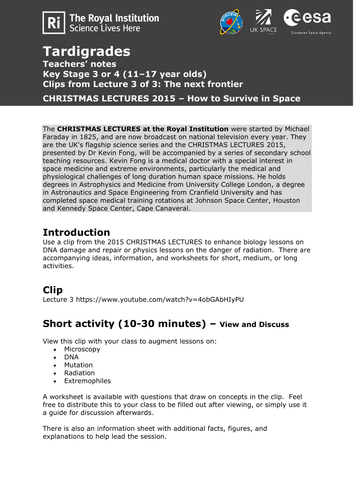





Biology lessons for 11-14 and 14-16 year olds on DNA damage and repair or physics lessons on the danger of radiation with short (10-30 minutes), medium (30-60 minutes) and long (60+ minutes) activities. They are based on video clips of the CHRISTMAS LECTURES from the Royal Institution, the UK's iconic science series on TV.
To use the resource, you'll need the Teachers Guide for the length of activity you want, alongside the video clip.
Video link
Tardigrades in space: https://youtu.be/4obGAbHIyPU
Short activity: View and discuss (10-30 minutes)
View this clip with your class to augment lessons on:
-Microscopy
-DNA
-Mutation
-Radiation
-Extremophiles
A worksheet is available with questions that draw on concepts in the clip. Feel free to distribute this to your class to be filled out after viewing, or simply use it a guide for discussion afterwards.
There is also an information sheet with additional facts, figures, and explanations to help lead the session.
Medium activity: Chinese whispers (30-60 minutes)
Use the clip as a starting point to discuss the causes and effects of DNA damage. This activity must take place after the class has a solid grounding in DNA as the information-carrying molecule that must be duplicated every time a cell replicates.
With a series of Chinese whispers/broken telephone games, introduce your class to the concept of mutations.
Long activity: Finding tardigrades (60+ minutes)
After watching the clip and learning about the effects of radiation on organisms, go out into the field with your class to find and describe some radiation-resistant tardigrades of your own. This activity requires multiple sessions and a laboratory equipped with microscopes. It will allow students to develop fieldwork and microscopy skills.
English curriculum links can also be downloaded.
This resource is part of Tim Peake's Principia mission education programme, supported by the UK Space Agency and ESA.
To use the resource, you'll need the Teachers Guide for the length of activity you want, alongside the video clip.
Video link
Tardigrades in space: https://youtu.be/4obGAbHIyPU
Short activity: View and discuss (10-30 minutes)
View this clip with your class to augment lessons on:
-Microscopy
-DNA
-Mutation
-Radiation
-Extremophiles
A worksheet is available with questions that draw on concepts in the clip. Feel free to distribute this to your class to be filled out after viewing, or simply use it a guide for discussion afterwards.
There is also an information sheet with additional facts, figures, and explanations to help lead the session.
Medium activity: Chinese whispers (30-60 minutes)
Use the clip as a starting point to discuss the causes and effects of DNA damage. This activity must take place after the class has a solid grounding in DNA as the information-carrying molecule that must be duplicated every time a cell replicates.
With a series of Chinese whispers/broken telephone games, introduce your class to the concept of mutations.
Long activity: Finding tardigrades (60+ minutes)
After watching the clip and learning about the effects of radiation on organisms, go out into the field with your class to find and describe some radiation-resistant tardigrades of your own. This activity requires multiple sessions and a laboratory equipped with microscopes. It will allow students to develop fieldwork and microscopy skills.
English curriculum links can also be downloaded.
This resource is part of Tim Peake's Principia mission education programme, supported by the UK Space Agency and ESA.
Something went wrong, please try again later.
This resource hasn't been reviewed yet
To ensure quality for our reviews, only customers who have downloaded this resource can review it
Report this resourceto let us know if it violates our terms and conditions.
Our customer service team will review your report and will be in touch.
£0.00
